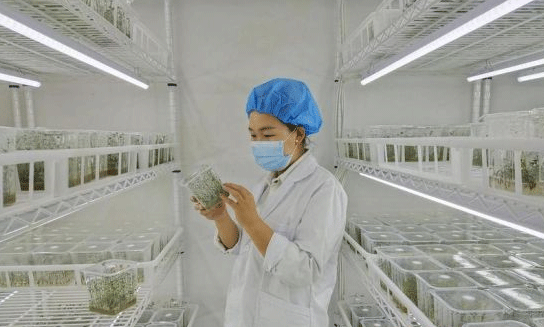Huangyang Town, located in the Wuwei City of Gansu Province, is witnessing a significant transformation in its potato industry. With the establishment of the Wuwei Jiahe Management Co., Ltd., the area is adopting advanced techniques for virus-free potato seed breeding, particularly focusing on the Gannongshu No. 7 variety. By leveraging a collaborative model known as “Company + Base + Farmers,” this initiative aims to produce around 7 million virus-free seedlings annually and approximately 10 million micro-potatoes, thus stimulating standardized and industrialized potato cultivation across the region.
According to Liu Xiaofei, head of the virus-free breeding center at Wuwei Jiahe, the focus is on creating a comprehensive potato industry chain that not only meets local production needs but also supplies deep processing enterprises. This integrated approach not only enhances productivity but also aligns with the local government’s goals to uplift agricultural practices and increase farmers’ incomes.
Innovations and Infrastructure Development
In addition to advanced breeding techniques, the establishment of a cold chain logistics base is addressing critical challenges in potato storage and transportation. The project, spearheaded by Wuwei Huizhong Agricultural Storage Supply Chain Service Co., Ltd., features three gas-controlled storage facilities capable of holding 60,000 tons of potatoes across 30,000 square meters. This infrastructure plays a vital role in ensuring the quality and marketability of potatoes, reducing post-harvest losses significantly.
With the introduction of rotation planting and cold storage technologies, over 20,000 acres of potato cultivation have been positively impacted, fostering a culture of standardized and large-scale production. This strategic move enhances the scientific value of potato farming, ultimately increasing the added value of agricultural products.
The impact of these initiatives is evident in the local economy. According to Yang Kun, manager of Wuwei Huizhong, the company plans to store 60,000 tons of potatoes this year, sourcing mainly from Huangyang Town and its surrounding areas. With daily storage capabilities reaching nearly 2,000 tons, the project has created significant employment opportunities, hiring about 160 workers daily, predominantly from local communities.
Economic and Social Impact
The ongoing developments in Huangyang Town are not just about increasing potato production but are also about invigorating rural economies. By focusing on agricultural strengths, optimizing industry layouts, and extending the industrial chain, local authorities are working diligently to elevate agricultural practices and deepen the integration of production and sales models. This synergy between various agricultural sectors is driving the rural revitalization agenda, helping to achieve the goal of enriching local communities through sustainable agricultural practices.
With the continuous efforts in enhancing agricultural practices, Huangyang Town is setting a precedent for potato industry revitalization that can serve as a model for other regions. The commitment to not only meet market demands but also improve the livelihood of farmers underscores the potential of agriculture to transform rural landscapes.
The advancements in the potato industry in Huangyang Town illustrate the power of innovation and collaboration in agriculture. By integrating advanced breeding techniques, establishing robust logistics infrastructure, and fostering community involvement, Wuwei is not only enhancing potato production but also paving the way for rural revitalization and economic growth. As these initiatives continue to unfold, they hold the promise of creating a more sustainable and prosperous future for the region’s agricultural sector.







